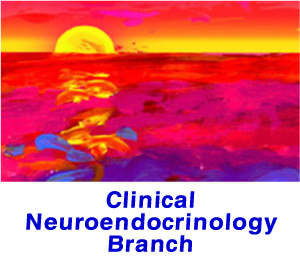

| Philip W. Gold, MD, Chief
The clinical research program of the Clinical Neuroendocrinology Branch (CNE) is committed to advancing knowledge that will improve the diagnosis, treatment and overall health of patients suffering from depression. The Branch studies the two major subtypes of unipolar depression, namely melancholia and atypical depression. Our work on these syndromes is divided into four interrelated areas: (1) elucidation of their pathophysiology; (2) identification of a biological marker; (3) understanding the mechanism of action of effective antidepressant agents (and applying this knowledge to the development of new treatments); and (4) identification of the health consequences of depression, such as decreased bone mineral density and premature coronary artery disease (and the development of strategies to counteract or correct these consequences). The Branch maintains a vigorous basic science laboratory spanning molecular endocrinology and neurobiology and uses transgenic and gene-knockout strategies to develop animal models of depression. Our focus is to elucidate further the functional relevance of specific genes that theoretically confer susceptibility to major depression. Trainees gain in-depth training in all clinical aspects of affective disorders, as well as in endocrinology and molecular biology. |
For further information call toll free: |
For information about NIMH and its programs, please email, write or phone us. This page was last updated: 03/18/2005. |